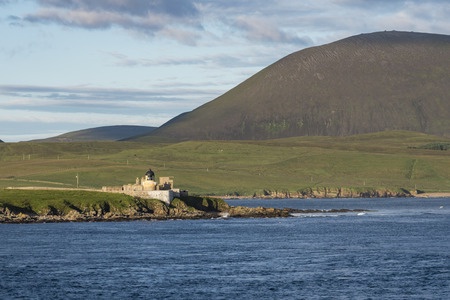Vikings in the far north of Scotland prospered through handing in their swords and swapping raiding for farming and fishing, a new study has found.
Research by a team of University of Aberdeen archaeologists has shown that despite their reputation as brutal plunderers, Viking settlers in Orkney found that ‘the plough was mightier than the sword’.
The study, published in the Journal of the North Atlantic examined archaeological evidence for Viking cemeteries from both Viking homelands in Scandinavia and Viking colonising sites in Britain, Ireland, and Greenland in order to better understand Viking populations, their size and composition.
Researchers were intrigued to find that the Viking communities that had settled in Scotland, particularly in the Orkney islands, had relatively good rates of fertility and higher rates of natural population increase, particularly when compared to settlements in Greenland.
The first known Norse colonies are believed to have been established in the Northern and Western Isles of Scotland in the 9th century as bases for raiding activities in Great Britain by Vikings from Southern Scandinavia.
Professor Marc Oxenham, from the University of Aberdeen, said: “The Norse met very different conditions when settling in the diaspora. Scandinavians who settled in Scotland and Ireland were immigrants into existing communities and had to negotiate their way into these communities, whilst colonisers of Iceland settled a previously uninhabited land and settlers in Greenland were concentrated in isolated communities with what seems little interaction with the native inhabitants of the island and in ecologically very challenging conditions.”
The study, which is part of a much larger British Academy funded project titled ‘Human Stress, Resilience and Adaptation in Ancient Ireland and Scotland’, examined these differences and the impact on population growth.
They investigated Viking fertility rates - the average number of births per woman - and rates of population increase or decrease.
Researchers found a very different demographic pattern in the Northern and Western Scottish Isles compared to other regions with a much higher proportion of children.
Professor Oxenham added: “Interestingly, we found the demographic health of Viking settlements in Greenland was relatively poor. Greenland was a challenging environment in which to seek out a living, and the Viking settlements were eventually abandoned by the 15th century AD.
“On the other hand, the research team was intrigued to find that the Viking communities that had settled in Scotland, particularly in the Orkney islands, had relatively good rates of fertility and higher rates of natural population increase.
“This suggests that a long history very effective of land management in Orkney - including the use of seaweed and manure, an increased focus on fishing, which along with evidence for good Pictish-Viking relations in the Orcadian Islands, likely contributed to a much healthier and vibrant community.
“Ultimately, the Vikings in Orkney found that the plough was mightier than the sword.”


